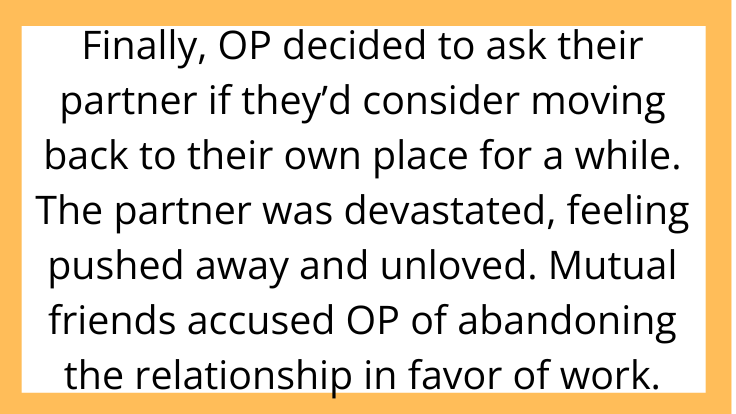AITAH for Asking My Partner to Move Out Because I Need Space to Focus on My Career?
When you’re in a committed relationship, the idea of asking your partner to move out—temporarily or permanently—can feel unthinkable. But what if your personal goals and mental health are suffering because you don’t have the space or focus you need?
Recently on r/AITAH, one poster described their situation: They had been living with their partner for over a year, but as their demanding career ramped up, they found themselves overwhelmed and desperate for solitude. Eventually, they asked their partner to move out so they could regain balance and concentrate on work.
The reaction from friends and family was swift and judgmental. Some called it selfish. Others called it necessary. So, does needing personal space to grow make you the bad person? Let’s look deeper.
The Scenario: Love, Cohabitation, and Ambition Collide

The OP explained that they loved their partner deeply, but working long hours in a high-pressure job was taking a toll. Having someone else in the house meant there was never true alone time to decompress. They tried setting boundaries—like quiet hours and separate workspaces—but nothing worked.
Finally, OP decided to ask their partner if they’d consider moving back to their own place for a while. The partner was devastated, feeling pushed away and unloved. Mutual friends accused OP of abandoning the relationship in favor of work.
So, was this a betrayal or a responsible step to avoid resentment and burnout?
Why Wanting Space Doesn’t Mean You Don’t Care

Many people equate closeness with constant togetherness, but a healthy relationship often requires breathing room. Here’s why:
-
Mental health matters: High-stress jobs or personal struggles can make cohabitation feel suffocating.
-
Boundaries prevent resentment: If you’re constantly drained, you can’t show up as your best self in the relationship.
-
Intent matters: Asking for space isn’t the same as ending the relationship.
The OP’s choice wasn’t about rejecting their partner—it was about creating an environment where both people could thrive.
How to Communicate a Need for Space Without Damaging the Relationship

Asking someone you love to leave the shared home, even temporarily, is sensitive. It’s important to handle it with empathy:
-
Be clear and compassionate: Avoid blame and focus on your own needs. For example, “I’m overwhelmed and need solitude to be okay.”
-
Offer reassurance: Let them know this doesn’t mean you love them less.
-
Create a timeline: If it’s temporary, discuss when and how you’ll revisit living arrangements.
-
Stay connected: Make plans to spend intentional time together outside the shared space.
These steps can help prevent your partner from feeling abandoned or unloved.
Why Others May Not Understand

One of the hardest parts of this situation is dealing with outside opinions. Friends and family often view moving out as a precursor to breaking up. They might say:
-
“If you really loved them, you’d make it work.”
-
“You’re prioritizing career over people.”
-
“This is selfish.”
But remember: no one else lives your life. If you need space for your mental health or personal goals, that doesn’t make you a villain. It makes you honest about your limitations.
What Reddit Had to Say

This AITAH post drew thousands of comments. Many applauded OP for recognizing their burnout and choosing self-care over pretending everything was fine. Others sympathized with the partner’s hurt, noting that communication and reassurance were key to avoiding long-term damage.
Ultimately, the consensus was that OP wasn’t inherently wrong for needing space, but the delivery and follow-through were critical.
Final Thoughts: Can You Love Someone and Still Need Distance?

Relationships are nuanced. You can love someone deeply and still recognize that your living arrangement isn’t sustainable. Prioritizing your mental health doesn’t mean you care any less—it means you’re willing to take hard steps to prevent resentment and protect your well-being.
If you ever find yourself in a similar situation, remember:
-
You’re allowed to need solitude.
-
Your feelings are valid.
-
Clear, kind communication can preserve love through difficult decisions.



